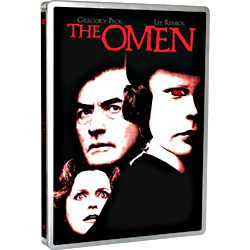Horror film scores and soundtracks generally only enter pop-culture dialogue when a notable name is at the helm (Trent Reznor seems to supplement his dwindling income via soundtrack-production gigs), and even then it’s often via a mediocre nu-metal single “inspired” by the movie that plays as the credits roll (Avenged Sevenfold on the Saw IV soundtrack is the latest musical marriage made in hell). With the exception of 28 Days Later‘s beautifully paced, postapocalyptic symphony, most of modern horror soundtracking is more irritating than eerie. However, discerning fans know that exploring the history of suspenseful soundtracks can be quite rewarding—you just have to look deeper into the archives. What follows is only a small slice of the most effective accompaniments, with an inherent bias toward the late ’70s:
Spellbound: Miklós Rózsa, composer (1945)
The theremin is an instrument that essentially sounds as if it were designed solely for the purpose of creating ambience for a haunted house. Rózsa’s unsettling score amplified the central themes in this Alfred Hitchcock suspense starring Ingrid Bergman as the lovesick psychiatrist treating amnesia-riddled murder suspect Gregory Peck. Nothing like a ghostly quiver of radio-frequency oscillators to convey doubt, fear, lust, and an overall sense of exploring the unknown. For that latter reason, it’s no surprise that the theremin shows up in all sorts of golden-age thrillers, including 1951’s The Day the Earth Stood Still.
Sisters: Bernard Herrmann, composer (1973)
Though he’s best known for his long relationship with Hitchcock (their collaborations yielded soundtracks for Psycho, North by Northwest, and Vertigo), Herrmann did a particularly excellent job on Brian De Palma’s study of previously conjoined, murderous twin sisters. The Moog-driven electronic soundtrack is clinically creepy, hinting broadly at the mental illness and physical deformities that drive the film’s climax. Hermann ended his career on an admirable, iconic note: His last composition was the desolate, brooding score for Taxi Driver.
The Omen: Jerry Goldsmith, composer (1976)
You know the over-the-top, glamorously foreboding choral requiem that studios now seem to use whenever they want to sauce up a preview for their thriller du jour? Well, that piece was originally used by Goldsmith to anchor this Richard Donner satanic blockbuster. While many strong horror film scores are most potent when you’re watching the film, The Omen‘s soundtrack is so fucking evil-sounding, you can easily scare yourself senseless just listening to it by itself. Incidentally, this Academy Award– and Grammy-winning soundtrack is even more treasure-worthy when considering the fact that it almost didn’t happen. Producers had to beg the studio for a last-minute budget increase just to secure Goldsmith’s skills.
Suspiria: Goblin, composers and performers (1976)
You can’t go wrong when it comes to artfully gory Italian horror, particularly the work of director Dario Argento, and you really can’t miss when the progressive-rock band scoring the film is named Goblin. Well, perhaps you could. But in this case, it’s one of the best. Wisely capitalizing on the film’s subplot involving ballerinas, the tinkling music-box undertones are just one of the delicately threaded needles that prickle the psyche throughout the film. A must for Krautrock fans, or anyone who can’t get enough avant-garde electronica.
Halloween: John Carpenter, composer (1978)
Unfortunately, the slasher genre of the late ’70s and early ’80s was infected with the same plastic sound that was slowly neutering pop music of that era: the synthesizer. This resulted in far too many unintentionally hilarious and dated-sounding scores, yet it ended up being a simple, effective tool for one of the greatest horror films of all time. It’s also a triumphant testimony to the work ethic of a budget-conscious director like Carpenter. Because of the film’s famous financial limitations, he chose to compose Michael Myers’ minimal and relentless musical cues himself. It was a shrewd move, but not unprecedented: Devil-mamma Mia Farrow was recruited by director Roman Polanski to sing the theme song to Rosemary’s Baby back in 1968.








